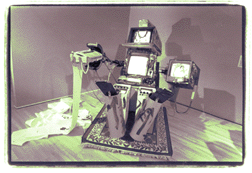

[ Metro | Metroactive Central | Archives ]
Couch Potato Bids Adieu
Gone With the Video: Couch Potato has at last decamped from his favorite corner at the San Jose Museum of Art.
The contest is over, but the winners linger on
VIDEO ARTIST Nam June Paik's Couch Potato installation at the San Jose Museum of Art's Electronic Super Highway exhibit has been packed up, but one last salient communication remains.
The winning response to Couch Potato's final question--Will individual genius give way to a cut-and-paste digital culture or will the tools of communication spawn a renaissance of creativity?--was submitted by Ira J. Woods of San Jose:
And then there are our previous questions and the winning answers:
From Jared Bronski of Stanford:
Is email a boon to personal communications or the death of letter writing?
From Michael Swick of Los Altos:
What is your greatest fear about the technological age?
From Len Cardone of San Jose:
Is the Internet a toy for the elite or a tool for populists?
From Sally Large of Los Gatos:
What is the role of art in cyberspace?
From Connie Harris of San Jose:
Should the Internet be censored?
From Mary Compton of San Jose:
What is your fondest dream for the age of technology?
From L.A. Kurth of Santa Clara:
Winners got to choose one of four prizes: 1) a $100 membership to the San Jose Museum of Art; 2) a one-year pass to the Arts Alive! concert series; 3) free enrollment in an art class; 4) a Paik Prize Gift Bag.
[ Metro | Metroactive Central | Archives ] This page was designed and created by the Boulevards team.

Christopher Gardner
Why assume creative genius will be either aided or hindered by technology? Once we begin to see the decline of greed and fame as the overriding motives for human creativity, a creative renaissance beyond our wildest dreams will emerge, eagerly devouring all the resources available at the time.
Is the Internet the CB radio of the '90s?
The CB analogy is an apt one--in both cases, the technology is indispensable to a small minority but isn't really ever needed by the majority. Face it--the whole World Wide Web is based on the premise that people really want a high-tech way to look at other people's vacation slides.
If you consider content over format, then email has added an immensely important dimension to communication. Handwritten script is a casualty of this latest medium, but email's ease, clarity, and convenience encourage people to interact with words who might otherwise not ... and anything that stimulates personal correspondence is great!
I worry that as more commerce and communication shift to the Internet, it will be harder for people to maintain their privacy. On a recent Web search, I found a mail message a friend wrote six years ago. Who knows how many of my letters are lingering out there?
The Internet's function ... will depend upon its application. Right now, there is an elite of sorts--a technical elite--who make more use of the tool because of accessing knowledge. Automobiles were once in the same position--only a few could afford them. Who ends up driving the Internet remains to be seen. Since I am a populist ... I think we need to focus on the problem of making access and education more universal.
Role of art you ask? Two words, I say, "Toy Story."
There is a fabulous, wonderful, built-in censorship device on every computer. It has no monthly charges and is extremely user-friendly. It is the off switch. No, the Internet should not be censored. People need to take responsibility for their own lives ... To allow censorship is to give permission to others to take this responsibility--our freedom--away from us, a thought I find way more scary than all of the cyber-sex chat rooms put together.
It isn't an either/or question, a choice between cyber-fantasy and 'real' contact. My online encounters have turned into real-life friends. My fondest dream for technology is that it bring support to the desperate, love to the lonely, answers to the curious, and growth to us all.
From the May 9-15, 1996 issue of Metro
Copyright © 1996 Metro Publishing and Virtual Valley, Inc.